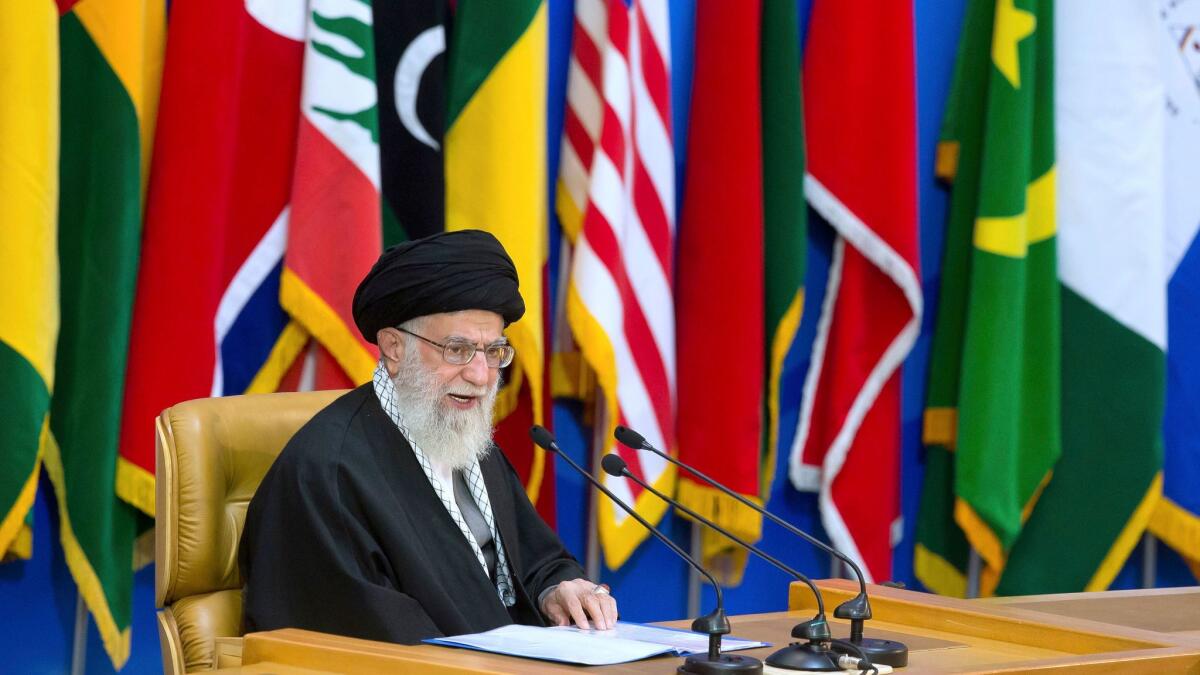Iran’s supreme leader rejects calls to release leaders of the 2009 Green Movement protests

- Share via
Reporting from Tehran — Three months before presidential elections in Iran, it appears incumbent Hassan Rouhani will not fulfill a key pledge he made before winning office: to free opposition leaders held under house arrest since a 2009 crackdown.
The supreme leader, Ayatollah Ali Khamenei, has rejected calls for “national reconciliation,” in effect guaranteeing that opposition leaders Mir-Hossein Mousavi and Mehdi Karroubi — leaders of the Green Movement protests that followed the disputed 2009 presidential election — will remain under house arrest.
It was the latest setback to reformists who back the moderate Rouhani, who signed the historic nuclear agreement that improved Iran’s relations with the West, but is facing criticism from conservatives as the economy has failed to improve even as many international sanctions were lifted.
Reformists had proposed the idea of reconciliation as a show of national solidarity in the face of the Trump administration, which has threatened to reconsider the nuclear deal and take a tougher line against the Islamic republic. It was floated by former reformist President Mohammad Khatami in a short statement this month before the anniversary of the 1979 Islamic Revolution that brought Iran’s theocracy to power.
But days later, Khamenei, who has the final say in all political matters in Iran, quashed the prospect by dismissing reconciliation as “meaningless” and arguing that Iranians were united.
“Are people not on speaking terms with each other?” Khamenei said in a speech televised nationally last week.
He went on to say that “people will not reconcile with those who beat up the Basiji on Ashura” — a reference to the view among hard-liners that Green Movement supporters sullied the Shiite Muslim holiday of Ashura in 2009 by taking to the streets, where they clashed with members of the state Basij militia.
News reports at the time suggested that it was the demonstrators, of whom several were killed and hundreds arrested, who bore the brunt of the violence.
Since the 2009 unrest, many educated Iranians and civil society leaders have pushed officials to release the protest leaders. Khamenei’s refusal showed how hard-liners have suppressed the hopes for greater political freedoms that accompanied Rouhani’s election.
“Ayatollah Khamenei’s rejection of national reconciliation is no surprise. It is in keeping with the unforgiving nature of Iranian politics and his character,” said Ali Vaez, Iran analyst with the International Crisis Group.
Vaez noted that previous Iranian leaders placed under house arrest never reemerged — including Mohammad Mossadegh, ousted as prime minister in a CIA-backed coup in 1953, and Hossein-Ali Montazeri, a leader of the Islamic Revolution who was marginalized after a falling-out with Khamenei. Both died while under house arrest.
Khatami, who ran afoul of the conservative establishment when he backed the Green Movement leaders, has been the subject of a media blackout since 2015, with authorities ordering publications and television not to print his name or photo. His remarks on reconciliation were made in a short speech over the Telegram social messaging network, accessible to Iranians using proxy servers.
Khatami was also a key supporter of Rouhani’s 2013 campaign.
“As long as Ayatollah Khamenei lives, the door remains shut on Khatami and his close associates,” Vaez said. “They still have influence, but cannot regain power.”
Nader Karimi Juni, a former political prisoner and analyst close to the reformist camp, said conservatives were unwilling to consider the release of Green Movement leaders until after the May 19 election so that Rouhani’s supporters “will not be able to use it in their campaign.”
Rouhani is expected to vie for reelection, although the ultraconservative Guardian Council, which oversees the vote, has not released the list of candidates.
The push for reconciliation gathered urgency with the death last month of former President Ali Akbar Hashemi Rafsanjani, a powerful ally of reformists. One of the few establishment figures to push for greater social freedoms and better relations with the United States, Rafsanjani has left a void in Iranian politics and underscored, for some, the shortcomings of Rouhani’s administration with his passing.
At state-sponsored services this month marking 40 days since his death, mourners said it was clearer than ever that Rafsanjani’s leadership could not be replaced.
“I liked him very much,” Hasan Alizadeh, a 40-year-old electrician, said at a security checkpoint at the entrance to the mausoleum. “He was a capable politician, but his protégé, President Rouhani, is not running the country well. Unemployment is increasing and the people’s purchasing power is plunging.”
Special correspondent Mostaghim reported from Tehran and Times staff writer Bengali from Mumbai, India.
Follow @SBengali on Twitter for more news from South Asia
More to Read
Sign up for Essential California
The most important California stories and recommendations in your inbox every morning.
You may occasionally receive promotional content from the Los Angeles Times.











